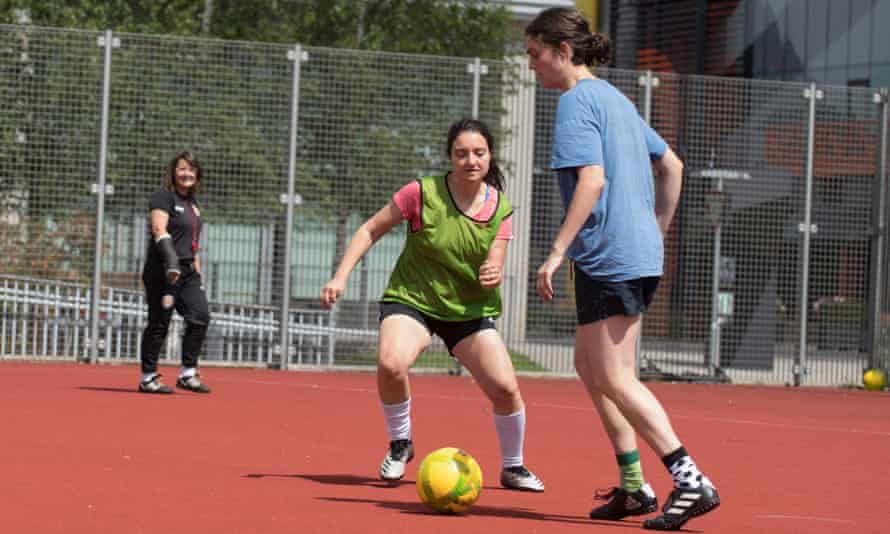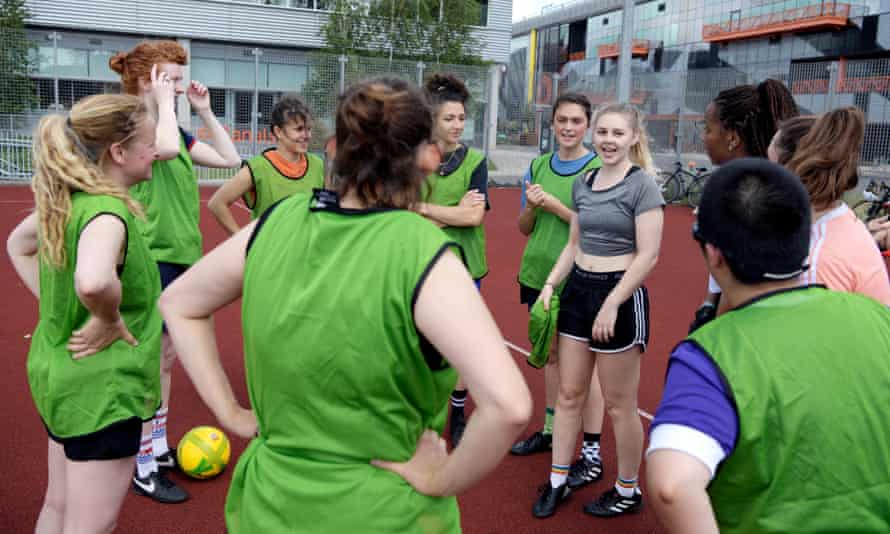‘Fun and the beautiful game’: rise of women’s recreational football
More women in England are making up for the decades when they felt shut out of the game

It’s Saturday-morning 11-a-side at a football pitch squeezed between a scrubby path running along the River Lee Navigation and a technology campus in Queen Elizabeth Olympic Park, Hackney. A dark-haired woman in red defies a gaggle of defenders with a skilled pass to the front. “Yes! Beginner’s debut, right there,” yells coach Julie Leaff at the top of her Mancunian lungs. The player breaks into a grin.
The camaraderie and joy on the pitch, where women are playing football, some for the first time, is noisy and infectious. This is Clapton Community Football Club’s open access training, one of thousands of grassroots sessions in England that have sprung up as women’s football has advanced. Unlike many targeted at encouraging young women and girls to take up the sport, however, it is for all ages.
“We wanted it to be open to older women,” said Leaff, 54, co-founder of the training session for women and non-binary people of all ages and abilities. “We wanted mums who watched their kids play, to realise they could step over the line and play themselves. To get that same buzz we got when we were 10 or 11. Before you got to secondary and some boy pinged your bra strap and said: “It’s a girl.”
Leaff, who teaches at Grasmere primary school in Stoke Newington, and co-founder Ellie Guedalla, 45, who works in children’s services are part of the “lost generation”, football fans whose gender meant they missed out on the opportunity to play and to develop in the sport when young.
My own football journey began at CCFC open access after the pandemic hit. In my fifties, I had never kicked a ball, knew nothing about the sport but loved the training. Last year, I was asked to join a spin-off vets team, brazenly named Hot Flush, and now play most weeks in a five-a-side women and non-binary people’s league, Super 5.

The Football Association barred women’s professional football from its club grounds in 1921, deeming it “quite unsuitable” for females. The ban, only lifted in 1971, set the tone for the sexism that still prevails in football today. Two decades passed before the FA established a women’s committee, with the first women’s FA challenge cup in 1993.
But since the pandemic, many women in their 30s, 40s and 50s appear to be making up for lost time. According to Sport England’s Active Lives survey, covering 2020-21, a higher percentage of women aged 35 to 54 have participated in the sport at least once in the past year or become a member of a football club than ever before.
Guedalla, who played for Wanstead Girls as a child, said: “Our generation never got to play in PE, let alone in the park. Me and Julie both played and we got called ‘It’, ‘What’s it’. That was normal in the 70s and 80s.”
With some football foundation cash from the CCFC, they set up the open access sessions in 2019. From a handful of people back then, the membership has grown to more than 100 today, with players aged between 22 and 60.
“We started with a flyer saying you don’t have to be Megan Rapinoe,” said Guedalla. “Julie borrowed some stuff from Grasmere. We thought if no one turns up we’ll go for a pint. But they turned up. And they haven’t stopped coming.”
With the Uefa Women’s Euro 2022, set to be a record-breaking tournament, just around the corner, those numbers are expected to grow. Research shows a significant increase in participation in football among women and girls after the 2019 Women’s World Cup, increasing by almost half a million among the over-25s.

Guedalla is passionate about the power of football for wellbeing, fitness and a sense of community.
READ RELATED: CRESSIDA BONAS on centre set up by her bereaved parents-in-law for those contemplating suicide
“When women come together things happen,” said Guedalla, who works in children’s services. “You put on a shirt and you’re part of something. It’s about fitness, fun and of course, the beautiful game.”
A growing number of women’s vets clubs include Crawley Old Girls, Canterbury Old Bags, as well as Bromley Belles FC, Bury FC Vets, Lewes FC and Maidstone Magpies.
Women talk about the optimism it has brought to their lives, and of the joy of pulling on a team jersey, of playing with others of all ages, of standing a bit taller as part of a team. They talk about the therapeutic benefits of exercise on their bodies, on menopausal symptoms and on the way they feel.
A few weeks ago, in Lancing, a coastal village near Brighton, Sussex County FA held its annual women’s recreational football festival. There were no scoreboards, tallies or trophies. The emphasis was on fun. But the same collective crescendo of cheers, recognised all over the world, greeted every goal, cutting through 1970s classics like Bang Bang blasting out of a loudspeaker on the pitch.
Taking a break from play, Carol Bates, 55, who founded Crawley Old Girls (Cogs) seven years ago, with a bit of funding from Crawley Town Football Foundation and the English Football League Trust, said: “To see what it does for some women’s physical and mental health is amazing. We’ve got women in their sixties running around tackling like legends. We have a 76-year-old, Susan, who comes to our walking football session. I watch these women’s faces and you see that joy, I want to do that when I’m 76.”
Cogs now run five sessions every week. “When we began, the common theme was we were the missing generation that never had a chance to play. Girls never got the chance to be coached. Boys and men take that for granted.
“If I say to women my age, come and play football, they say ‘I don’t know anything about football’ and ‘I’m not fit.’ I say, ‘You’re exactly the women we want.’”
Bates, who was awarded the British Empire medal for services to football and inclusion last year, said: “With the women’s Euros coming up and the legacy project, there is the anticipation it will bring another 20,000 women playing.”
In 2020 Sport England and the FA awarded £1m to the hosting of the women’s Uefa Euro 2022, aimed at creating more opportunities for women’s recreational football in nine host cities: Manchester, London, Trafford, Sheffield, Rotherham, Milton Keynes, Wigan and Leigh, Brighton and Hove and Southampton.
At 66, Viv Moore, a retired teacher from Crawley, is the oldest member of COGs. She began playing three years ago. “It gives you a chance to get in touch with your younger self,” said Moore.” When I score a goal, I’m like a child, I get so excited. It’s such a lovely sense of achievement.”
","isTracking":false,"isMainMedia":false,"source":"The Guardian","sourceDomain":"theguardian.com"}”>
Jackie Cox, 53, a mother of three who plays in goal and started Kingswood Ladies three years ago, said: “It’s grown massively: there are 30 of us now.”
Cox, a breast cancer survivorship coordinator at the Royal Marsden, said: “When Covid hit, people wanted to be outside. We train Fridays, play matches most Sundays. We have a couple of girls in their 20s but most are 40-plus.”
Kim Joselyn, 61, a community centre manager, recalls hiding her football kit in a hedge as a child, fearful of the reaction from her mum. She went on to play for Shoreham and Brighton in her 20s, but only recently returned, to play for Cogs. “They are all great girls. They bring you out of yourself. I would be lost without them.”
Source: Health & wellbeing | The Guardian




